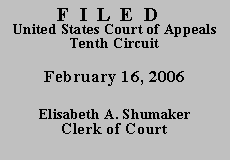

The district court, however, found that the sentencing court conducted a
colloquy with Mr. Castillo-Olivas sufficient to overcome any concerns regarding
the knowing and voluntary nature of the plea. And as to the ineffective
assistance of counsel claim, Mr. Castillo-Olivas specifically alleges that his
counsel failed to anticipate and inform him that the Supreme Court was
considering Blakely v. Washington, 542 U.S. 296 (2004), which was decided
three months after Mr. Castillo-Olivas was sentenced. While ineffective
assistance of counsel claims in connection to entering a plea agreement are not
waived by the plea agreement, we agree with the trial court that the failure to
anticipate Blakely and then United States v. Booker, 543 U.S. 220
(2005), does
not constitute ineffective assistance of counsel. See, e.g., United States v.
Gonzalez-Lerma, 71 F.3d 1537, 1542 (10th Cir. 1995) ("Counsel's assistance is
not ineffective simply because counsel fails to base its decisions on laws that
might be passed in the future."). The district court then denied Mr. Castillo-Olivas a certificate
of appealability.
To qualify for a certificate of appealability, Mr. Castillo-Olivas must make
a "substantial showing of the denial of a constitutional right." 28 U.S.C. §
2253(c)(2) (1994). To meet this burden, he must demonstrate "that reasonable
jurists could debate whether (or, for that matter, agree that) the petition should
have been resolved in a different manner or that the issues presented were
adequate to deserve encouragement to proceed further." Slack v. McDaniel, 529
U.S. 473, 484 (2000) (quotation omitted).
We have carefully reviewed Mr. Castillo-Olivas' brief, the district court's
disposition, and the record on appeal. Nothing in the facts, the record on appeal,
or Petitioner's filing raises an issue which meets our standard for the grant of a
certificate of appealability. For substantially the same reasons set forth by the
district court in its March 10, 2005 Memorandum and Order, we cannot say "that
reasonable jurists could debate whether (or, for that matter, agree that) the
petition should have been resolved in a different manner." Id.
We DENY Mr. Castillo-Olivas' request for a certificate of
appealability
and DISMISS the appeal.
Entered for the Court
Monroe G. McKay
Circuit Judge
UNITED STATES OF AMERICA,
Plaintiff - Appellee,
v.
JORGE CASTILLO-OLIVAS,
Defendant - Appellant.
Before HENRY, McKAY, and EBEL,
Circuit Judges.
This is an appeal under 28 U.S.C. § 2255. Mr. Castillo-Olivas pleaded
guilty to violating 8 U.S.C. § 1326(a) and (b)re-entry after deportation
following conviction for an aggravated felony. The sentencing court calculated
his sentencing range to be forty-one to fifty-one months' imprisonment and on
July 28, 2004, sentenced Mr. Castillo-Olivas to forty-one months' imprisonment.
One condition of Mr. Castillo-Olivas' plea agreement waived his "right to
challenge a sentence or manner in which it was determined in any collateral
attack, including, but not limited to, a motion brought under [28 U.S.C.
§ 2255] . . . ." Memorandum and Order, 2 (D. Kan. Mar.
10, 2005). Despite this
explicit waiver, Mr. Castillo-Olivas filed a § 2255 petition and argued that the
waiver should not apply because it was not knowing and voluntary and because
he suffered from ineffective assistance of counsel.
![]() | Keyword |
Case |
Docket |
Date: Filed /
Added |
| Keyword |
Case |
Docket |
Date: Filed /
Added |
![]() (24743 bytes)
(24743 bytes)
![]() (14795 bytes)
(14795 bytes)
Comments to: WebMaster,
ca10 [at] washburnlaw.edu.
Updated: February 17, 2006.
HTML markup © 2006, Washburn University School of Law.
URL: http://ca10.washburnlaw.edu/cases/2006/02/05-3208.htm.